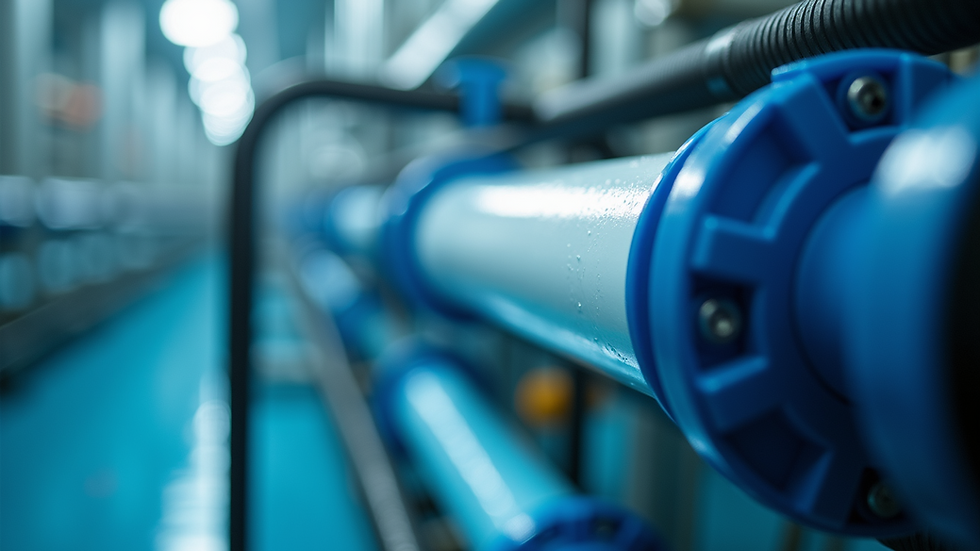The Importance of Reliable Water Filtration for Marine Use
- Omri Farbstein

- Jun 10, 2025
- 4 min read
In the marine environment, ensuring the quality of drinking water is critical. From leisure boaters to commercial fishing vessels, access to clean and safe drinking water is essential. Reliable water filtration systems become paramount not just for human health but for the overall well-being of anyone aboard a marine vessel.

Understanding Water Filtration
Water filtration is the process of removing impurities and contaminants from water. This is especially vital in marine settings where saltwater and other pollutants pose serious challenges. Effective water filtration systems can transform seawater into freshwater, making it safe for consumption.
Statistics reveal that nearly 80% of all marine pollution comes from land-based sources. This means that filtering water on boats and ships is crucial in mitigating the impact of pollution. Depending on the filtration technology used, marine water filtration systems can eliminate bacteria, viruses, and even microplastics, making water safe.
Types of Water Filtration Systems for Marine Use
In the marine industry, various types of water filtration systems are available. Here are three common types:
1. Reverse Osmosis Systems
Reverse osmosis (RO) is one of the most effective water filtration methods. This system pushes seawater through a membrane, filtering out salt and most contaminants. An RO system can provide a large volume of purified water, making it suitable for larger vessels.
According to the National Oceanic and Atmospheric Administration (NOAA), marine vessels equipped with RO systems can produce up to 20,000 gallons of freshwater daily. However, regular maintenance is crucial to keep the system functioning efficiently.
2. Activated Carbon Filters
Activated carbon filters are used primarily for improving taste and odor in water. These filters remove organic compounds and some chemicals but do not desalinate water. They are often utilized in conjunction with other systems to create a multi-stage filtration process.
A study published by the Marine Pollution Bulletin indicated that activated carbon systems could reduce harmful contaminants by up to 90%. This makes them an excellent option for smaller vessels where space is limited.
3. UV Water Purification
Ultraviolet (UV) water purification uses UV light to kill bacteria and viruses present in water. This method is particularly effective in eliminating microorganisms without adding chemicals. UV systems require the water to be pre-filtered to remove larger particles.
The CDC recommends UV purification as a reliable method for ensuring water safety, especially in areas where chemical treatment is not feasible. However, UV systems generally don't remove chemical contaminants or sediments, making them most effective when used alongside other filtration methods.

The Impact of Inadequate Water Filtration
Failing to invest in a reliable water filtration system can lead to dire consequences. Contaminated water can cause various health issues, including gastrointestinal infections, dehydration, and, in severe cases, death. A report by the World Health Organization (WHO) stated that poor water quality is responsible for about 485,000 deaths each year.
On the operational side, inadequate filtration can result in higher maintenance costs for water systems and equipment due to corrosion and scaling caused by impurities. Additionally, crew members and passengers will have a negative experience aboard a vessel lacking safe drinking water, which can affect the overall reputation of a boating or fishing operation.
Best Practices for Maintaining Water Filtration Systems
To ensure the longevity and efficiency of water filtration systems aboard marine vessels, following best practices is essential:
1. Regular Maintenance Checks
Conduct regular checks on your water filtration system. Implement a schedule for replacing filters and cleaning components. Keeping the system in good working order is crucial for ensuring safe drinking water.
2. Monitor Water Quality
Regularly test the quality of the water produced by your filtration system. This includes checking for any changes in taste, smell, or clarity and conducting bacteriological tests. Being proactive in monitoring will help detect potential issues before they escalate.
3. Familiarize with System Capabilities
Not all filtration systems are created equal. Familiarize yourself with the specific capabilities and limitations of your water filtration system. Knowing what contaminants your system can handle will help you choose the right combination of technologies.
4. Training Crew Members
Ensure crew members are trained to operate and maintain the filtration systems correctly. Proper handling and knowledge of the system will contribute to its efficiency and safety.
5. Invest in Reliable Technology
When selecting water filtration systems, invest in reputable brands that offer high-quality products. Look for systems that meet international safety standards and have good reviews from other marine users. This will ensure you are not compromising on safety.

The Future of Marine Water Filtration
As technology advances, the future of marine water filtration looks promising. Innovations are leading to more efficient, compact, and sustainable systems. Research is underway to enhance portable filtration technologies that can be easily installed on smaller vessels or even personal watercraft.
The incorporation of renewable energy sources, such as solar power, into water filtration systems is another exciting development. As the marine industry prioritizes sustainability, the use of energy-efficient, eco-friendly water filtration systems will revolutionize how vessels obtain and utilize freshwater.
In addition to advancements in technology, awareness and education are crucial. As more mariners recognize the importance of reliable water filtration, a shift towards employing advanced systems is likely to occur, ultimately enhancing safety at sea.
In summary, reliable water filtration is not just an option but a necessity in marine environments. By understanding the different filtration types, maintaining systems routinely, and investing in the future of water purification technology, vessel operators can ensure the safety and well-being of everyone on board. For a comprehensive range of solutions, explore purified water systems designed for marine use.




